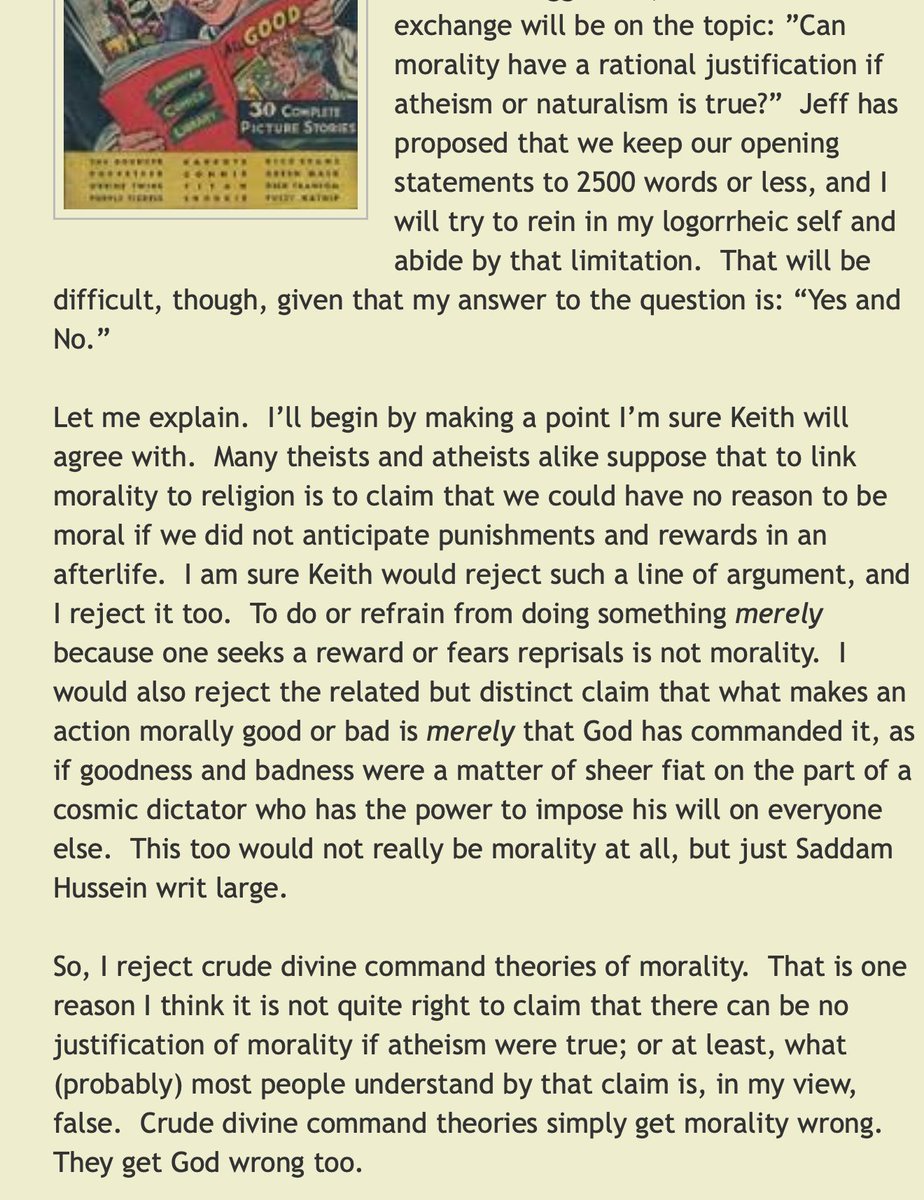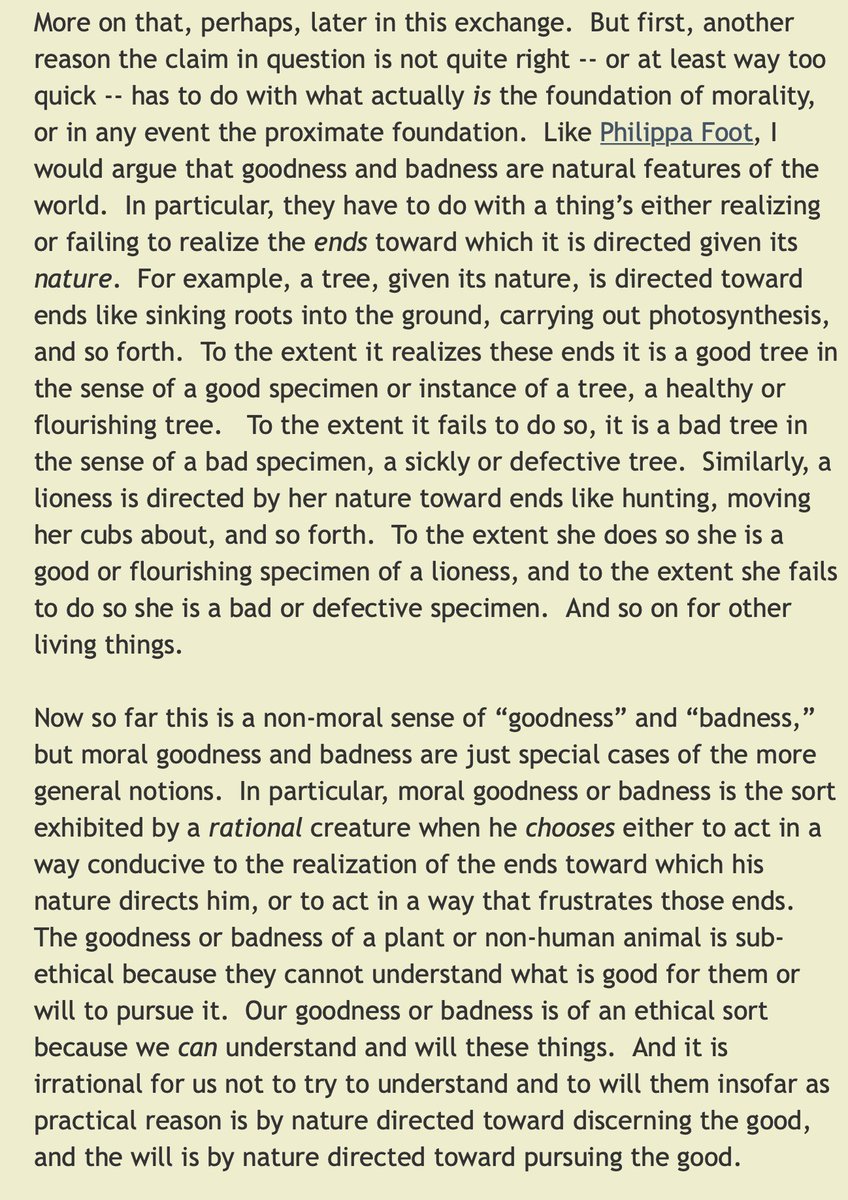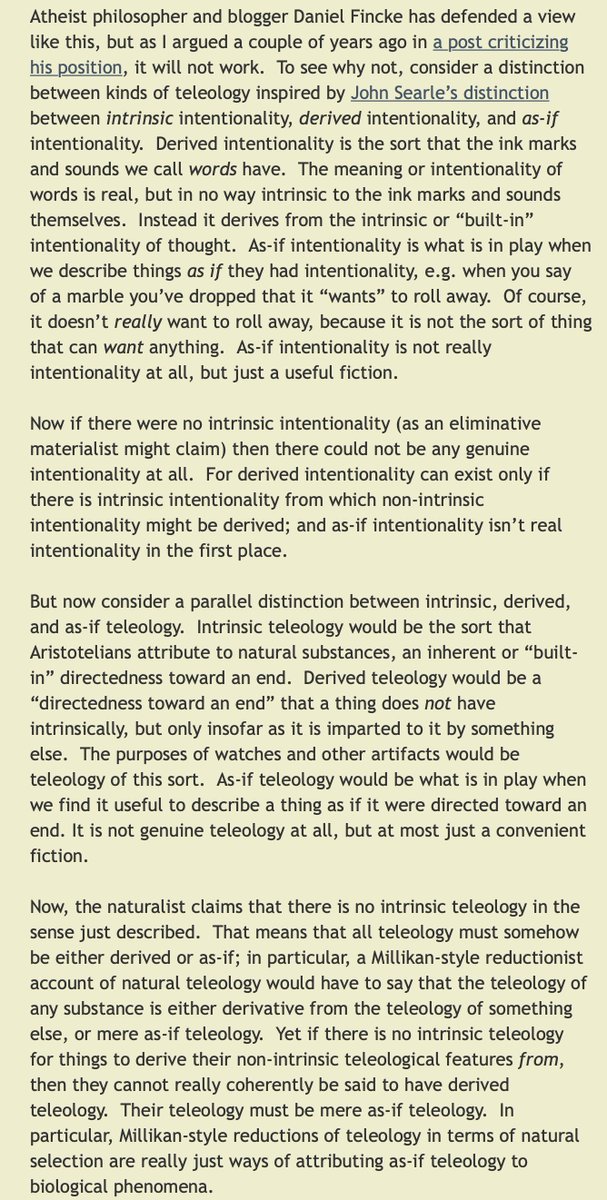
”Can morality have a rational justification if atheism or naturalism is true?”
Let’s see how Ed Feser tackles this question and if it is (more or less) how I do.
Let’s see how Ed Feser tackles this question and if it is (more or less) how I do.
Good so far
Morality understood as a system of rewards and punishments is JUST NOT morality.
Neither does the mere fact of God commanding something make it right, as if God were a cosmic dictator.
These ideas of the relation of morality to God get both God and morality wrong.
Morality understood as a system of rewards and punishments is JUST NOT morality.
Neither does the mere fact of God commanding something make it right, as if God were a cosmic dictator.
These ideas of the relation of morality to God get both God and morality wrong.

Also so far, so good.
The PROXIMATE ground of morality is NATURE, that is, the NATURES of things, and for beings with rational natures, as expressed in the NATURAL LAW.
This classical understanding of NATURE must be distinguished from the MODERN ONE, which has no moral force.
The PROXIMATE ground of morality is NATURE, that is, the NATURES of things, and for beings with rational natures, as expressed in the NATURAL LAW.
This classical understanding of NATURE must be distinguished from the MODERN ONE, which has no moral force.

“Good” for a given thing means “that which realizes/completes its nature.”
“Evil” for a given thing is whatever inhibits its realization/actualization/completion of its nature.”
“Evil” for a given thing is whatever inhibits its realization/actualization/completion of its nature.”
The question that soon comes up, however, is “what obligates us to do what is good?”
Even in the classical conception of Nature, nothing makes being virtuous OBLIGATORY—it is better, it is the path to happiness, εὐδαιμονία, which all men desire. But what makes this BINDING?
Even in the classical conception of Nature, nothing makes being virtuous OBLIGATORY—it is better, it is the path to happiness, εὐδαιμονία, which all men desire. But what makes this BINDING?
Kant thought “nothing at all,” since NATURE (Kant is a modern) provides no obligatory force. Kant thought to find it in REASON. But that just raises the parallel question: Why should I listen to reason? I am a rational creature by nature, but Kant rejects the appeal to nature.
My general view is that what God does—one thing that God does—is to provide morality with is OBLIGATORY FORCE.
Anyway, let’s get back to Feser.
Anyway, let’s get back to Feser.
Feser: a natural ground for goodness presupposes at the very minimum a teleological concept of nature, that is, the classical conception rather than the modern “scientific” conception (which is actually not a conception at all, but a methodological stipulation).
So one could be an atheist AND give a kind of grounding to morality, viz. a proximate grounding in the natures of things and the natural law, but NOT on a modernistic “naturalism.” 





And of course Feser is entirely correct that THE CLASSICAL TELEOLOGICAL UNDERSTANDING OF NATURE has NOTHING to do with Paley’s “watchmaker”-style argument or recent “intelligent design” arguments.
Feser: without REAL intentionality (which requires real natural ends, τέλη), there cannot be ANY intentionality, and hence no morality.
Naturalistic morality turns out to be a game of “let’s pretend,” viz. “let’s pretend there’s some obligation to do good or further well-being."
Naturalistic morality turns out to be a game of “let’s pretend,” viz. “let’s pretend there’s some obligation to do good or further well-being."

When Sam Harris wants to ground a naturalistic “scientific” morality in “human well-being”, the trouble isn’t so much that he is WRONG about well-being being a natural good, but that HIS OWN NATURALISM DISALLOWS HIM THE CONCEPT—except as a game of “let’s pretend.”
Harris, of course, REALLY agrees with Dawkins, that there JUST ISN’T anything intrinsically more or less moral about “furthering human well-being” than anything else—but he asks that we all “pretend” that there is.
This hustle works because what Harris asks us to “pretend” is true, is actually true, so many people are willing to go along with Harris’ game of make-believe.
It isn’t hard to get people to play make-believe when what you ask them to make-believe is ACTUALLY TRUE.
It isn’t hard to get people to play make-believe when what you ask them to make-believe is ACTUALLY TRUE.
But the fact remains that what Harris asks us to pretend is true and act “as if” it is true, even though it is true, it CANNOT BE TRUE FOR HARRIS.
It MUST BE make-believe.
Harris can’t hold it to be actually TRUE (even though it happens to be, which is why people accept it).
It MUST BE make-believe.
Harris can’t hold it to be actually TRUE (even though it happens to be, which is why people accept it).
So it follows that Harris has no answer to the Nietzschean who says “Fuck human well-being. The proper object of human action is to create something GREATER than human, the Übermensch, and that requires A LOT of human suffering, and so what?”
But I digress. Back to Feser.
It’s an important point though:
the “Harris Hustle” works because he asks us all to “pretend” there’s a real basis for morality and to act “as if” there is one—which his own worldview utterly disallows—but the “let’s pretend” and “act as if” WORKS (kind of) because IT’S TRUE.
the “Harris Hustle” works because he asks us all to “pretend” there’s a real basis for morality and to act “as if” there is one—which his own worldview utterly disallows—but the “let’s pretend” and “act as if” WORKS (kind of) because IT’S TRUE.
Now back to Feser.
And of course Feser is entirely correct that THE CLASSICAL TELEOLOGICAL UNDERSTANDING OF NATURE has NOTHING to do with Paley’s “watchmaker”-style argument or recent “intelligent design” arguments.
I forgot to post Feser’s last before commenting on it. 🤦🏻♀️
I forgot to post Feser’s last before commenting on it. 🤦🏻♀️

I already commented on this part of Feser’s piece, so let’s go on to the next.
Feser: So while atheism of a sort may be compatible with morality, in a qualified way, NATURALISM is not compatible with morality, and the vast, vast majority of atheists are naturalists.
Naturalistic atheism is NOT compatible with morality.
Naturalistic atheism is NOT compatible with morality.

And non-naturalistic atheism, while (apparently) logically possible, seems very hard to say what it would even be like.
But I’ll kick it back to Feser, because even a non-naturalistic atheism (whatever the hell that is) can only have morality in a qualified sort of way.
Thought through, morality needs an ultimate GROUND and STANDARD which makes NATURAL GOODS good, and morality OBLIGATORY.
Thought through, morality needs an ultimate GROUND and STANDARD which makes NATURAL GOODS good, and morality OBLIGATORY.

That’s it for Feser’s opening statement to Parsons. But I’ll add one of the essays Feser links to, where he fleshes out the dependence of morality on God in an ULTIMATE, though not PROXIMATE, sense. 







• • •
Missing some Tweet in this thread? You can try to
force a refresh












